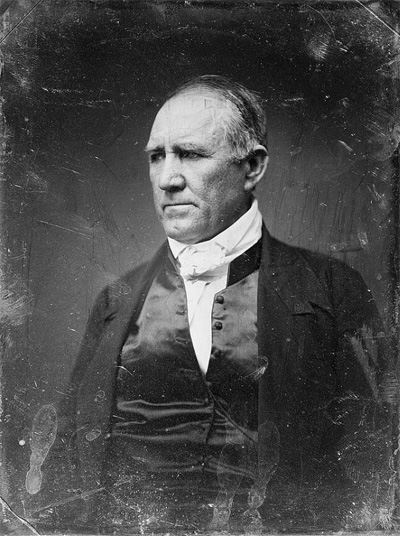Sam Houston’s birthday on March 2 prompted us to search our archives for contemporary accounts of the charismatic statesman. The Post ran several stories between 1825 and 1861 that reflect the erratic progress of Houston’s career and personal life.
As a boy, Houston fled his fatherless family to live among the Cherokee in Tennessee. By 1812, he returned to the white community to join Andrew Jackson’s struggles against the British and their American Indian allies. Building on the reputation he had earned in battle, Houston studied law after the war. He ran for office and was elected to congress in 1823, and the governorship of Tennessee in 1827.
But his rising fortunes suddenly plummeted in 1829 when his young wife left him. He abandoned his campaign for re-election and lit out for the territories. Taking up residence among the Cherokee in Arkansas, he opened a trading post and earned a reputation for hard drinking and a hot temper.
Yet he emerged once more, this time in Texas, where he was appointed a general in the Texan army. After his victory at Santa Jacinto, which led to Texan independence, Houston was elected president of the infant republic. He was instrumental in getting Texas admitted to the Union, and he was the young state’s senator from 1846 to 1859.
The Post ran several items on Sam Houston in his time. It followed the progress of his Texas army’s rebellion against Mexico and reported his role in the victory at San Jacinto.
The Post also published several items that tracked the progress of Houston’s private life.
On May 15, 1830, this item appeared:
“Gen. Sam Houston, late Governor of Tennessee, has arrived in Nashville, from the East, on his way to his new residence among the Cherokee Indians in Arkansas.”
And, on July 24, 1830:
“Governor Houston, late of Tennessee, and more recently a resident among the Cherokees of the Arkansas, is, it seems, about to try his fortune in the Indian trade. We understand that during his late visit to New York, he, in connection with a gentleman from Nashville, purchased goods to the Amount of $20,000, for this express purpose. He has been adopted as the son of Jolly, a Cherokee Chief.”
The man who had become Congressman at only 30 was now setting up a trading post in the wilderness, turning his back on a promising legal and political career.
Historians agree that Houston was motivated by his failed marriage to Eliza Allen, a woman half his age. There is less agreement on what caused the marriage to collapse so catastrophically.
A Post story in 1871 attempted to explain “Why Sam Houston Exiled Himself.”
“The reason of the strange disappearance of Samuel Houston, in the early part of his life, when he left a lovely bride and the governorship of Tennessee, and exiled himself among the Indians for many years, has lately been revealed. He discovered, within a few hours after his marriage, that his wife did not love him, but had been urged into the match by an ambitious family, while loving another man. He at once retired from the house, and by his subsequent exile gave the lady a right to the divorce which she obtained.”
This explanation was, and remains, speculation. Neither Houston nor Eliza left any record of the true reason.
Following his wife’s departure, Houston returned to the Cherokee. He married a native-American woman named Tiana Rogers, the niece of his new father, Chief Oolooteka (John Jolly).
Houston tried to rebuild his life among the Cherokee, running his store, planting orchards, and occasionally traveling to Washington to expose government agents who were defrauding the tribe and breaking its treaties. Yet he was never fully at peace. Houston’s Cherokee name was “Raven,” but he was earning a new name among the tribe “Big Drunk.”
While in Washington, Houston was involved in a savage fight with a corrupt Congressman. Arrested for assault, he was defended in court by lawyer and “Star Spangled Banner” author Francis Scott Key. Houston was acquitted, but was heavily fined by a civil court for his actions. Once again, Houston departed for the frontier. This time, though, he went beyond Arkansas to Texas. His wife, Tiana, remained in the Cherokee nation and never saw Houston again.
Houston didn’t marry again until Texas had gained independence and he was its president. Now 47, he married 21-year-old Margaret Moffette Lea. Together they had eight children.
Margaret had a steadying influence on her flamboyant husband. With their marriage, Houston became more deliberate, less rash, and a more capable administrator. He was able to exert influence in Washington in favor of his state and the union.
Margaret Lea Houston was one of those invaluable Americans who refine the character of their politician-spouses. Throughout American history, the wives of legislators, judges, and chief executives—women of intelligence, wit, and compassion, who were barred from office themselves—have helped promote their husband’s careers. More importantly, many have ensured that their husbands remained true to their ideals and the public’s interest.
On April 7, 1849, the Post printed the following anecdote with a recommendation that it should be read by the wives of America.
“Gen. Houston and Wife. We take the following from one of our exchanges (we have forgotten which), confessing that we thought Gen. Houston separated from his wife or rather his wife from him—many years ago. Perhaps, though, this is a second one. But for the anecdote:
“Gen. Samuel Houston, of the United States Senate, formerly Governor of Tennessee, and after President of Texas (before the annexation), owes as much to his wife’s influence as to any other cause for his present high character and position before the nation. At a large party lately given in Washington, by Mr. Speaker Winthrop, he took occasion to give his reason for declining to attend any and all of the balls, card-parties, etc., to which he is invited. His wife, like Mrs. Polk, is a religious woman. (By the way, there was no dancing, gambling or drinking at the White House whilst Mrs. Polk presided there.) Let the wives of America read the following remarks made at Speaker Winthrop’s party by Senator Houston:
“‘I make it a point,” said the honorable Senator, “never to visit a place where my lady, if she were with me, would be unwilling to go. I know it would giver her pain, as a Christian, to attend such places, and I will not go myself where I could not take my wife.”
“A Member of Congress present alluded to his own wife, and added that there was a mutual understanding between him and her that they should each follow the bent of their own inclination in such matters.
“That may do for you,” responded Mr. Houston, “but with me it is different from what it is with many men. My wife has been the making of me. She took me when I was the victim of slavish appetites—she has redeemed and regenerated me—and I will not do that in her absence which I know would give her pain if she were present.”
“What a mighty, though secret, power has a virtuous and sensible woman over the greatest and strongest of men, if that man is her husband!”
Become a Saturday Evening Post member and enjoy unlimited access. Subscribe now




Comments
It’s been an interesting evening.
I stopped for dinner at the Mayflower Restaurant in Brayce (?), Va, re-read the Mayflower Compact, wondered whether the Virginia whither the Puritans meant to arrive was the same size as the current Virginia, and then found, attempting to answer the above question, that Sam Houston was born in Virginia.
Sam Houston wed in Tennessee
A much younger Eliza lass.
She did not love Sam, and so he
Let divorce and loss come to pass.
Then went alone to Arkansas.
Tiana of Cherokee blood
Wedded Sam, but she mostly saw
A drunken, fighting mately dud.
She saw him no more when Sam went
To Texas and to a new bride.
And Margaret was heaven sent,
A happy marriage till Sam died.
States of matrimonial lives
Changed with Sam and each of his wives.